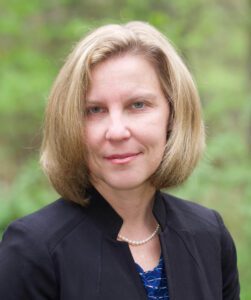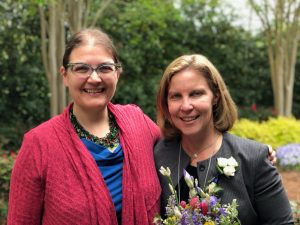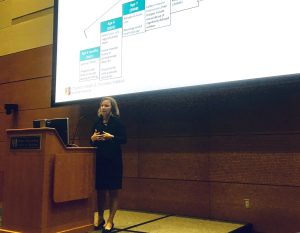As part of the Center for Child and Family Policy's 25th Anniversary celebration, we are honoring faculty, researchers, and staff who have contributed to the Center's work, culture, and impact.
Beth Gifford is a research professor in the Sanford School of Public Policy and a core faculty member of the Center for Child and Family Policy. Read on to learn more about her research at the Center, why she loves the CCFP Community, and her family's favorite local restaurant.
What year did you start working at the Center for Child and Family Policy and what initially drew you to CCFP?

Can you briefly describe your role at CCFP?
As a research professor, my primary role is to conduct research. CCFP has felt like a home to do service-driven work that is relevant to addressing needs now. For example, from 2015-2018, I directed the Durham Children’s Data Center which brought together leaders from our county, our schools, social services, and early childhood services to engage in the co-creation of data-driven projects that could inform decision making. By co-designing research studies with community partners, I engage in a variety of projects that use data to shed light on opportunities for improvement and to evaluate progress toward goals.
Can you share a little about one of the first projects you worked on at CCFP (we’ve heard rumors of a data linkage project that was a huge undertaking)?
An early and BIG project for me was leading the evaluation of the Child and Family Support Teams Initiative. This initiative placed 100 nurse-social worker teams into 100 schools in 21 counties with the goals of improving academic success and preventing out-of-home placements.
Much of your recent work has been in partnership with researchers on the medical side of Duke through the Children’s Health & Discovery Initiative. Can you share how your collaboration with CHDI began and the goal of that work?

One thing many people may not know is that you split your time at Duke between CCFP and the VA. What is the focus of your work at the VA?
I work in the Durham Cooperative Studies Epidemiology Center in the Durham Veteran’s Affairs office (Durham VA). This is a service-directed center which means that the research we conduct is in response to VA and congressional requests on Veteran Health. Most of my work in this setting has been on the health of veterans of the 1990-91 Persian Gulf War. In this work, I’ve begun to partner with colleagues here at Duke who study aging, at both demographic and biological levels. I’ve found the research, the colleagues, and the interaction with veterans through the public science meetings to be very rewarding.
What’s one way you’ve seen your CCFP research impact policy at a local, state, or federal level (or, one way you hope to see it impact policy)?
Recently, I worked with the North Carolina Department of Health and Human Services on the North Carolina Early Childhood Action Plan. I have enjoyed hearing communities talk about their efforts and local action plans and efforts to support young children.
If you had to choose just one, what is a takeaway from your research that you would want to share?

What’s one of your favorite stories or memories from your years at CCFP?
My favorite times spent with my colleagues at the Center have often come during road trips to meetings and conferences. I’ve gotten to learn a lot of cool things about my co-workers in this way!
How has CCFP changed during your time here?
We’ve grown, we’ve learned and we’ve kept innovating! I increasingly appreciate the thought and care that went into creating the Center for Child and Family Policy—particularly the focus on scientific rigor with sense of urgency. It brings together people who are passionate about their work and who dedicate so many of their waking hours—not just week after week, but year after year. I also appreciate the optimism of community—whenever I think “we can’t do that,” there’s someone else to say “we got this.”
What’s something people might not know about you?
My hometown is home to Sesame Place, the theme park version of Sesame Street. Before it was a water park, it was a hybrid playground with cool play areas and computer labs. My first introduction to computer programming was at Sesame Place, where I learned Logo. We wrote programs to move a “turtle” around the screen—and got to imagine that the triangle was that turtle.
What’s one of your favorite local restaurants and what’s your favorite thing to order on the menu?
My family goes to the Root Cellar in Chapel Hill pretty frequently. It’s a nice place to sit a little too long.
What is your favorite genre of music, tv, books and/or film? What are you currently listening to, reading, or watching?
I really like comedy and with the Durham Performing Arts Center and other local venues I get see many performers. I love audiobooks so that I can walk or a virtual bike ride and listen—Lately, I’ve really enjoyed the books by Taylor Jenkins Reid.